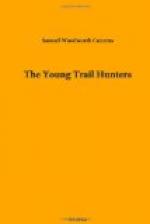“Now for it,” cried Jerry, “give it to ’em!” and we forthwith gave them a volley that caused two of their number to fall headlong to the ground. This brought the party to a halt, and they retreated out of the range of our rifles, for the purpose of holding a consultation.
While they were thus engaged, one of the Mexicans called Jerry’s attention to a solitary Indian who was approaching our wagons from the rear. Jerry immediately pronounced him to be the Arapahoe, whom we had seen with the party of Missourians.
He soon came up with us, and brought the intelligence that his party was only a short distance behind and would soon be in to help us.
This was indeed good news; but, before they could possibly reach us, the Comanches, who had evidently made up their minds to once more attack, began their old plan of riding around us in a circle, discharging their arrows with such good effect that one of the Mexicans was shot in the thigh.
Jerry, and the Indian guide, both advised us to reserve our fire until the enemy should come within range of our revolvers; but their arrows came so thick and fast we decided to give them one more volley from our rifles; this we did, having the good fortune to see two more of the party suddenly tumble from their horses’ backs. This put an end for the time being to their attack, for they soon disappeared over the bluff.
“We was too much for ’em that time, old pard,” said Jerry, familiarly slapping the Arapahoe upon his naked shoulder. Then, turning to me,—
“I was s’prised, though’ to see how them youngsters stood up ter the rack. Boys as a gineral thing hain’t got no bizness on the plains, no how; but these are a-goin’ to larn Injin fightin’, sartin.”
“Umph! putty muche boy no good,” responded the Arapahoe, in deep guttural tones.
“Where’s your folks, old pard?” inquired Jerry. “Better be hurryin’ up; we’ve got ter be a-goin’, as soon as I put this chaw er terbacy on that Mexican feller’s leg; nothin’ like it to take the sore out, you know.”
The mules were now harnessed to the wagons, and everything ready for a start, when the Missourians put in an appearance. We received them right gladly, and joyfully welcomed them to our party. We started in company; but soon ascertained it would be impossible for them to keep up with us on the road, their oxen travelled so much slower than our own teams. We parted from them with reluctance; for all the indications thus far seemed to convince old Jerry that the Indians would without doubt prove very troublesome on the trip, and the larger the party the more safety, always.
We saw no further signs of their presence until quite late in the afternoon, when Jerry called my attention to a small, oblong pile of stones, that stood in a conspicuous place a short distance from the trail we were following.
“That’s a Comanche sign,” said Jerry.
“Pooh! it’s nothing but a pile of stones,” said Hal.




